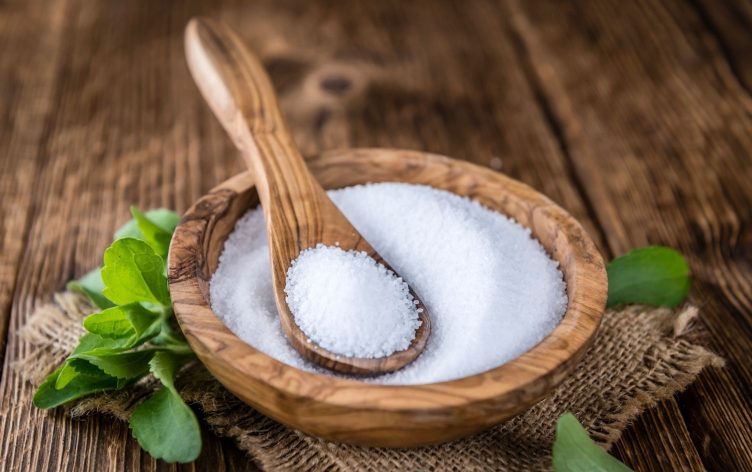
Pick up any health magazine, and you’ll likely see an article about sugar in one form or another. From glucose and evaporated cane juice to pure maple syrup and honey, good ol’ added sugar goes by lots of fancy names these days! One of the newer players in the sugar game is stevia, a zero-calorie “natural” sweetener. There’s no debating that stevia has stolen the spotlight from its artificial cousins, Splenda (sucralose) and Sweet’N Low (saccharin). It may taste like sugar, but is it more natural? Better yet, is it healthier? The answer may surprise you.
WHAT IS STEVIA?
Stevia is a small shrub in the chrysanthemum family native to Paraguay and Brazil. It has been around since ancient times, used primarily as a low-calorie sweetener but also for medicinal purposes, such as increasing glucose tolerance (think: your tissues’ ability to absorb glucose, a sugar, from the bloodstream and use it for energy). It is nearly 200 times sweeter than table sugar, won’t raise your blood sugar, is widely available and doesn’t leave much of an aftertaste. Score! You may have seen stevia on store shelves under brand names like Truvia and Pure Via.
IS IT NATURAL? IS IT HEALTHY?
Yes and yes — but stevia and Truvia (or Pure Via) are not the same thing. Let’s break it down.
The stevia plant has two sweet compounds, stevioside and Rebaudioside A (Reb A or rebiana). While studies show that the former may help reduce blood sugar and blood pressure, there is limited evidence to date on the health benefits of Reb A. The patented refining process used to create highly purified Reb A involves extracting, isolating and combining Reb A with “natural flavors” and other sugar alcohols to create the powder you put in your coffee. In short, there is some serious processing from plant to packet!
IS IT SAFE?
Likely. Let’s take a look at stevia’s recent history. First, understand that any products marketed as “stevia” are either whole-leaf stevia or extracts other than Reb A — none of which has been evaluated by the FDA to be used as a sweetener.
The FDA banned stevia in 1991 due to preliminary studies suggesting that it may lead to cancer. This was revoked in 1995 when the FDA ruled it safe to be sold as a food supplement. They then granted GRAS (generally recognized as safe) status to Reb A in 2008 after the makers of Pure Via and Truvia submitted research supporting its safety. Whole-leaf stevia and stevia extracts, however, are still considered dietary supplements.
FINAL VERDICT: SHOULD I USE STEVIA?
The short answer is yes. It’s a better alternative to artificial sweeteners and may help with glucose tolerance. Nonetheless, use it in moderation. The fact remains that similar to artificial sweeteners, stevia hasn’t been around long enough to conduct long-term studies evaluating its health effects in humans. It’s safe to say that when consumed in reasonable amounts, stevia is a good natural sugar substitute. Consider trying a little bit of the real stuff in moderation like pure maple syrup, raw honey or coconut sugar. Or better yet, sweeten your treats with fruit like ripe bananas and dates!
Originally published January 2017





